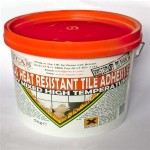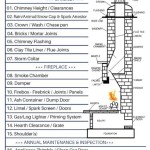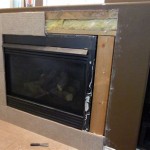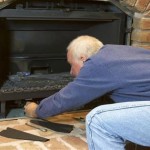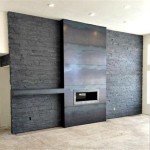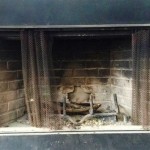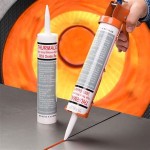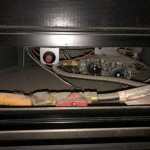Damper on Fireplace: Function, Risks, and Maintenance
The fireplace damper is a crucial component of a functional and safe fireplace system. Located within the chimney, typically just above the firebox, its primary role is to regulate airflow, preventing drafts when the fireplace is not in use and controlling the rate of combustion during a fire. Understanding the damper's function, potential problems, and proper maintenance is essential for homeowners who rely on fireplaces for heating and ambiance.
A damper is essentially a metal plate that pivots or slides to open or close the chimney flue. When closed, it seals the chimney, preventing outside air from entering the home and conditioned air from escaping. This action is particularly important during colder months, as it minimizes heat loss and lowers energy bills. Conversely, when open, the damper allows smoke and combustion gases to vent properly out of the chimney, preventing them from entering the living space.
Key Point 1: The Function of a Fireplace Damper
The core functionality of a fireplace damper revolves around two primary purposes: draft prevention and combustion control. When closed, the damper prevents drafts, which can significantly reduce the efficiency of a heating system. A chimney acts as a natural conduit for airflow due to the temperature difference between the inside and outside of the home. This difference creates a pressure differential, drawing air up the chimney, even when the fireplace is not in use.
Without a properly functioning damper, this constant airflow can lead to significant heat loss, especially in older homes with less insulation. Cold air entering through the chimney displaces warm air, forcing the heating system to work harder to maintain a comfortable temperature. This increased workload translates directly into higher energy consumption and increased heating costs.
During a fire, the damper's role shifts to controlling the rate of combustion. By adjusting the opening of the damper, homeowners can regulate the amount of air that enters the firebox. More air allows for a more vigorous burn, while less air slows down the combustion process. This control is crucial for achieving optimal heat output and preventing the fire from burning too quickly or smoldering excessively.
A properly adjusted damper also helps to prevent the buildup of creosote, a flammable substance that accumulates in the chimney as a byproduct of incomplete combustion. By ensuring sufficient airflow, the damper promotes a cleaner burn, reducing creosote formation and minimizing the risk of chimney fires.
Key Point 2: Risks Associated with a Malfunctioning Damper
A malfunctioning fireplace damper can pose several risks to both the home and its occupants. These risks range from energy inefficiency to potentially dangerous situations, making regular inspection and maintenance of the damper paramount.
One of the most common risks is energy inefficiency. A warped, rusted, or otherwise damaged damper may not seal properly, even when closed. This incomplete seal allows for continuous airflow through the chimney, leading to significant heat loss during the heating season and increased cooling costs during the warmer months. This wasted energy translates directly into higher utility bills, making it crucial to address any damper-related issues promptly.
Another significant risk is the potential for carbon monoxide poisoning. Carbon monoxide is a colorless, odorless, and highly toxic gas produced by the incomplete combustion of fuels, including wood. If a damper is closed or partially closed during a fire, it can prevent the proper venting of combustion gases, leading to a buildup of carbon monoxide inside the home. This buildup can quickly reach dangerous levels, posing a serious threat to the health and safety of the occupants.
A stuck or difficult-to-operate damper can also contribute to chimney fires. When a damper is not fully open, it restricts airflow, leading to incomplete combustion and increased creosote buildup. Creosote is highly flammable, and even a small spark can ignite it, causing a rapid and intense fire within the chimney. These chimney fires can spread to the surrounding structure, posing a significant risk of property damage and personal injury.
Finally, a damaged damper can allow animals and debris to enter the chimney. Birds, squirrels, and other small animals often seek shelter in chimneys, and a compromised damper provides easy access. These animals can build nests inside the chimney, blocking the flue and creating a fire hazard. Debris, such as leaves and twigs, can also accumulate in the chimney, further obstructing airflow and increasing the risk of chimney fires.
Key Point 3: Maintenance and Troubleshooting of Fireplace Dampers
Maintaining a fireplace damper is essential for ensuring its proper function and preventing potential problems. Regular inspection, cleaning, and lubrication can significantly extend the life of the damper and minimize the risk of associated hazards.
The first step in maintaining a fireplace damper is regular inspection. Homeowners should inspect the damper at least once a year, preferably before the start of the heating season. The inspection should include a visual assessment of the damper plate for signs of rust, warping, or damage. The damper mechanism should also be checked to ensure that it opens and closes smoothly without excessive force.
Cleaning is another crucial aspect of damper maintenance. Over time, soot, creosote, and other debris can accumulate on the damper, hindering its movement and reducing its sealing effectiveness. To clean the damper, start by removing loose debris with a brush or vacuum cleaner. For more stubborn deposits, a scraper or wire brush may be necessary. Be careful not to damage the damper plate or mechanism during the cleaning process.
Lubrication can also improve the performance of a fireplace damper. Apply a heat-resistant lubricant to the moving parts of the damper mechanism, such as hinges and pivots. This lubrication will help to prevent corrosion and ensure smooth operation. Avoid using oil-based lubricants, as they can attract dust and debris, potentially causing the mechanism to seize up.
If the damper is stuck or difficult to operate, try gently loosening the mechanism with a penetrating oil. Allow the oil to soak in for a few minutes before attempting to move the damper. If the damper remains stuck, it may be necessary to disassemble the mechanism for cleaning and lubrication. If the damper is severely damaged or beyond repair, it should be replaced by a qualified professional.
In addition to these basic maintenance tasks, it is also essential to ensure that the chimney is properly cleaned and inspected by a certified chimney sweep on a regular basis. A chimney sweep can identify potential problems with the chimney and damper, such as cracks, blockages, and excessive creosote buildup, and recommend appropriate repairs or maintenance measures.
Homeowners should also be aware of the different types of fireplace dampers available. Traditional throat dampers are located at the base of the chimney, just above the firebox. Top-sealing dampers, also known as chimney caps with dampers, are installed at the top of the chimney and provide a tighter seal, reducing heat loss and preventing animals and debris from entering the chimney. Consider upgrading to a top-sealing damper for improved energy efficiency and protection.
Furthermore, always remember to open the damper completely before starting a fire and to ensure that the fire is completely extinguished before closing the damper. This practice will help to prevent carbon monoxide poisoning and reduce the risk of chimney fires. By following these maintenance and troubleshooting tips, homeowners can ensure that their fireplace damper functions properly and safely, providing years of reliable service.

How To Open A Chimney Damper Traditional Fireplace Pros

How Do Fireplace Dampers Work Zoro Com

Top Mount Vs Throat Dampers Fireplace Damper Portland Oregon

What Is A Chimney Damper Full Service

How To Use A Fireplace Damper The Right Way

Fireplace Flue Dampers Ensure Optimal On

Fireplace Damper Repair Full Service Chimney Kansas City

Types Of Diffe Chimney Dampers Severna Park Pasadena Md

What Is A Chimney Damper Why It Important

Stop Losing Heat Up Your Fireplace Chimney Ohmefficient

